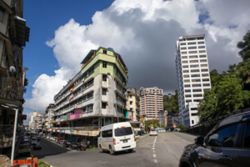
Six bodies were found by hotel staff in a fifth-floor room of the Grand Hyatt Erawan around 5.30pm on July 16. - AP
BANGKOK: A Vietnamese-American, Sherine Chong, has been identified by Thai police as the suspect who is believed to have poisoned five others at the luxurious Grand Hyatt Erawan hotel in Bangkok, before killing herself with the poison.
Cyanide poisoning is likely the cause of the deaths, police said.
Chulalongkorn Hospital said on Wednesday (July 17) that an autopsy of the six people found dead in the same hotel suite found traces of cyanide.
The bodies showed traces of the rapid-acting chemical and had purple lips, indicating a lack of oxygen, the hospital’s Dr Kornkiat Vongpaisarnsin told reporters, adding more tests were being conducted.
Thai investigators came to the conclusion after questioning witnesses, including the daughter of one of the dead, said Police Major-General Theeradej Thumsuthee, the head of investigation of Bangkok’s Metropolitan Police Bureau, as cited by Thai newspapers Khaosod and Bangkok Post on July 17.
Debt issues are suspected to be the motive behind the deaths, said Maj-Gen Theeradej. Thai police are not looking into other possible suspects, as Suite 502, where the bodies were discovered, had been locked from the inside and no one else was found to have entered. There were no signs of a struggle.
Investigators suspect the victims had been dead for 24 hours by the time they were found.
Chong is suspected to have poisoned the others before committing suicide, Thai police said on July 17.
“The case likely stems from a debt problem. There are no other possibilities. The culprit is among the six (dead) because they were the only people who entered the room. There were no others,” Maj-Gen Theeradej said.
The debt is suspected to have resulted from an investment in a construction deal that went south.
After questioning witnesses, including some of the deceased’s relatives, investigators said the victims were a mix of borrowers, lenders and guarantors. Two of the deceased were married to each other.
Citing information from witness interviews, Bangkok deputy police chief Noppasin Punsawat said Chong had been given the equivalent of around 10 million baht (S$374,000) by the couple to invest in building a hospital in Japan.
The couple, aged 49 and 47, had suspected her of cheating them as there had not been much progress in the project and sought to iron out their differences in Thailand, after visa issues prevented them from meeting in Japan.
The three men and three women were all of Vietnamese descent. Two of them – including Chong, 56 – were American citizens.
One of the victims was 37-year-old Vietnamese make-up artist Phu Gia Gia, who reportedly worked with Vietnamese celebrities and beauty queens. He was mourned by his family, as well as his fans, who left their condolences on his Facebook page when news broke of his death.
Their bodies were found by hotel staff in a fifth-floor room of the Grand Hyatt Erawan around 5.30pm on July 16, hours after they had been expected to check out.
Their belongings, which had been packed as though the victims were ready to leave, have been taken by the police for investigations.
Closed-circuit television footage captured all six of the group entering the hotel with their suitcases on the afternoon of July 15, likely making their way to the suite. It is likely the last time they were seen outside the room.
The group had booked several rooms under seven names on different floors, said Bangkok police chief Thiti Saengsawang.
The seventh person is the younger sister of one of the deceased, Khaosod news outlet reported. She had left Thailand on July 10, and is not suspected to have any involvement with the deaths.
Lieutenant-General Thiti noted that the group of six had ordered food via the hotel’s room service, but it was untouched, with only some drinks consumed. Photos of plates of fried rice, vegetables and tom yum soup wrapped in plastic have been circulated online. Only one of the plates had its plastic seal removed.
Forensic investigators cited by Khaosod on July 17 said they found cyanide in a thermos flask in the room. They described cyanide as a toxic, potent substance. The substance had been mixed into a drink resembling black coffee.
“We found cyanide in the teacups, all six cups we found cyanide,” commander of the Thai police evidence office Trirong Phiwpan told a press conference on July 17.
“After staff brought teacups and two hot water bottles, milk and teapots... one of the six introduced cyanide.”
The police suspect Chong poisoned the others, as the flask did not belong to the hotel.
Police investigations are ongoing. The US Federal Bureau of Investigation has assisted in the investigation. Vietnam’s embassy in Bangkok said it was working with the Thai authorities on the case.
Thai Prime Minister Srettha Thavisin on July 16 ordered a swift probe into the unnatural deaths to limit any impact on the kingdom’s tourism sector.
The Grand Hyatt Erawan hotel in downtown Bangkok is a five-star luxury hotel popular with tourists. It is next to the Erawan Shrine, which regularly attracts throngs of devotees. - The Straits Times/ANN










































